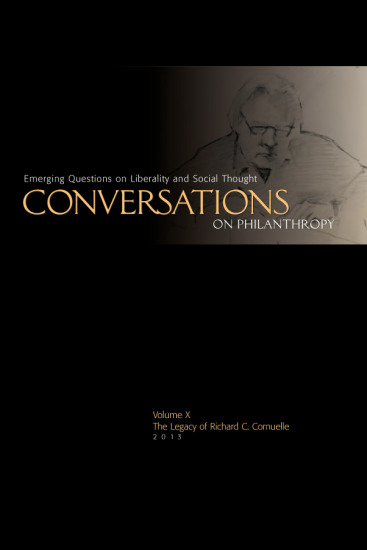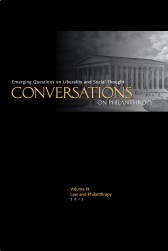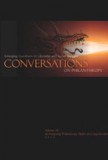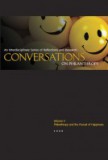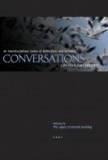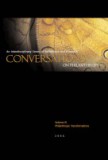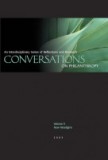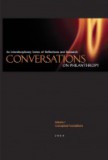Interested in learning more? Subscribe to our mailing list.
Conversations on Philanthropy is an annual publication of The Philanthropic Enterprise. Seeking to ignite reflection and discussion on the role of beneficence in the social order, Conversations features academic papers, essays, and reviews by scholars, philanthropists, and social entrepreneurs

Volume III Philanthropic Transformations, 2006
Download the entire journal as a PDF ![]()
Volume III of Conversations on Philanthropy marks the beginning of our second full year of publication. In this volume, themed Philanthropic Transformations, we somewhat modify our previous conversational formula to bring you a single conversation rather than two. The two papers anchoring this volume, “Dancing the Measures of Transformation,” by anthropologist Heather Wood Ion, and “Fostering Sustainable Complexity in the Microfinance Industry: Which Way Forward?” by economist Emily Chamlee-Wright, proved sufficiently complementary that we asked our commentators to engage both essays in their reflections. Read More...
HEATHER WOOD ION is a chief executive and cultural anthropologist who holds dual degrees from Oxford University and specializes in turning around troubled organizations. Her doctoral research on social and cultural recovery from disasters has been applied to assist communities and corporations in trouble all over the world. She has turned around communities locked in adversarial paralysis, social service agencies, corporations that have lost their mission, and start-ups unable to cope with growth. She taught for over two decades at universities including the University of Heidelberg, Cal-Poly Pomona, and Western University of Health Sciences and is a frequent lecturer in medical schools on the social issues of health care delivery and medical ethics. For the last seven years of his life, Jonas Salk, MD, relied on Heather Ion as his editor, sounding board and collaborator on issues of international health policy, and in establishing the science of hope. Dr. Ion’s book, Thirdclass Ticket, has been translated into Italian, Hindi, Japanese, and Chinese, and is currently being made into a feature film. Another book, with Saul Levine MD, Against Terrible Odds, applies her knowledge of social and cultural recovery to the profound issues of individual resilience. Dr. Ion has served on numerous boards and national initiatives, including The Valeo Initiative, in collaboration with the Center for Healthcare Improvement and the Veterans’ Health Administration to ‘create an epidemic of health’. She currently serves as Chief Executive of The Goldie Hawn Institute.
EMILY CHAMLEE-WRIGHT is Associate Professor of Economics at Beloit College. She is author of The Cultural Foundations of Economic Development (Routledge 1997) and co-author of Culture and Enterprise: The Development, Representation, and Morality of Business (Routledge 2000) with Don Lavoie.
ALEJANDRO ANTONIO CHAFUEN has twenty-five years experience in the not-for-profit sector, both here and abroad. He has been president and CEO of the Atlas Economic Research Foundation since 1991. Mr. Chafuen is a member of the board of several grant seeking and grant giving foundations including the Chase Foundation of the Commonwealth of Virginia; the Acton Institute for the Study of Religion and Liberty; The Fraser Institute; the Hispanic American Center for Economic Research; and ex-officio, is a member of the John Templeton Foundation and the Templeton World Charity Foundation. He has authored several works on ethics and economics and, on issues relevant to the philanthropic sector, he has written “Holding Think Tanks to High Standards” (http://www.thegoodsteward.com/article.php3?articleID=1393) and Corporate Social Responsibility: A Traditional Catholic Perspective in Business and Religion: A Clash of Civilization? Nicholas Capaldi, ed. (Loyola University, New Orleans: 2005)
DAVID ELLERMAN works in the fields of economics and political economy, social theory and philosophy, and in mathematics. His undergraduate degree was in philosophy at M.I.T. (‘65), and he has Masters degrees in Philosophy of Science (‘67) and in Economics (‘68), and a doctorate in Mathematics (‘71) all from Boston University. He has been in and out of teaching in economics, mathematics, accounting, computer science, and operations research departments in various universities (1970-90), founded and managed a consulting firm in East Europe (1990-2), and worked in the World Bank from 1992 to 2003 where he was an economic advisor to the Chief Economist (Joseph Stiglitz and Nicholas Stern). Now he is a visiting scholar at the University of California in Riverside. He has published numerous articles in various fields (see Curriculum Vitae) and five books.
CLAIRE MORGAN is director of the Social Change Project at the Mercatus Center at George Mason University. Her primary concern is to promote innovative, interdisciplinary work that integrates theory and practice to promote greater freedom and prosperity. Before joining Mercatus, Claire was a fellow at the Liberty Fund in Indianapolis, Indiana. She received her Ph.D. in Government and Politics from the University of Maryland, College Park, where she was managing editor of the PEGS Journal, The Good Society. She has spent time as a visiting fellow at the Institute of Economic Affairs in London and at the Institute for Humane Studies in Arlington, Virginia. She also holds degrees in Applied Philosophy (Bowling Green State University), Political Theory (London School of Economics), and Politics (London Guildhall University).
FREDERICK TURNER is the Founders Professor of Arts and Humanities at the University of Texas at Dallas. He is the author of sixteen books of poetry, criticism, and fiction, including The New World: An Epic Poem; Rebirth of Value; Meditations on Beauty, Ecology, Religion and Education; and Tempest, Flute and Oz: Essays on the Future.
J.D. VON PISCHKE is president of Frontier Finance International, a Washington-based company that is affiliated with IPC and ProCredit Holding. IPC is a consulting firm that is in the forefront of starting microfinance banks that operate on a commercial basis. ProCredit Holding is the owner of nineteen microfinance banks in as many countries in Eastern Europe, Latin America and Africa. Dr. Von Pischke worked in project and policy positions in the World Bank for twenty years and has produced eight books, as editor or author, and many articles on financial sector development, with special emphasis on the small end of the market. He earned his PhD at Glasgow University in Scotland.
JEFFREY ASHE is the manager of community finance at Oxfam America. Prior to coming to Oxfam, Mr. Ashe founded and served as executive director of Working Capital, the largest microenterprise program in the United States. Before Working Capital, Mr. Ashe was director of the “PISCES Project,” the first worldwide investigation of programs reaching the smallest economic activities of the poor. He also served as senior associate director at ACCION International where he assisted in the dissemination of peer group lending throughout Latin America. Mr. Ashe designed, assisted, and evaluated microenterprise programs in thirty-five countries in Asia, Africa, Latin America and Eastern Europe for the World Bank, the Agency for International Development, CIDA, ODA, and many NGO clients. In addition, he developed microenterprise projects in Arkansas, North Dakota, and Canada. Before his work in the microenterprise field, Mr. Ashe directed a nation-wide rapid rural appraisal for the Costa Rican government and served as a Peace Corps Volunteer in Ecuador. Mr. Ashe has published extensively in the microenterprise field and is the author of several books and articles on the topic. He also teaches microfinance at Brandeis and Columbia Universities. He holds a BA in Political Science from the University of California, Berkeley, and an MA in Sociology from Boston University.
—Heather Wood Ion
Peter Drucker said that 95 percent of what matters in an organization cannot be counted. J. K. Galbraith said, “If it is not counted, it tends not to be noticed.” Demming estimated that 95 percent of the time within an organization is spent on measuring or counting something. The implications of these facts are obvious. In addition, Drucker (1994) said that no time in recorded history has seen such a radical social transformation as our own. Many of us share a purpose of supporting social and personal transformations, in part because of the additional sense of meaning such activity brings to us, and in part because we all share a sense of frustration that the disconnections of our world are too frequently increased rather than improved by conventional efforts to ameliorate them. Read More...
—Emily Chamlee-Wright
Abstract: The microfinance movement has gained tremendous popularity over the past thirty years, but it is still far from meeting its full potential. The industry stands at a crossroads between increased commercialization and increased philanthropic aid. Standard economic discourse does little to resolve the debate. F. A. Hayek’s concept of the “extended order” sheds new light on how we might understand the future development of microfinance. Read More...
These two fine essays, although as different in style and approach as they could be, address a shared issue. And despite their apparent contradictions, they do not basically disagree, and can be seen as different parts of a common solution.
The fundamental issue that both authors grapple with is the apparent absence, in philanthropic activity, of an Invisible Hand—of a self-organizing, polycentric, calculative process that transcends the limitations of its participants and points them all to the real needs and opportunities in the field. The price mechanism is the classic example in economics. Other areas of human activity are known as well for their marvelous ability to generate robust and subtle signals out of the local interactions of a multitude of actors even though individually such actors may be blinkered by selfishness, weakness, myopia, and unawareness of the big picture.
The scientist and philosopher Michael Polanyi would cite the process of normal science, in which the system of learned journals, testable hypotheses, repeatable experiments, peer review, and a currency of professional esteem combine with the rivalrous and ambitious selfishness of individual scientists to create robust knowledge. Likewise the system of legal review, in which stare decisis and precedent combine with appellate court discipline, constitutional principle, and legislative innovation to produce a modicum of justice, even when advocacy is, on the individual level, often unscrupulous and self-interested. Similarly, the system of separation of powers, democratic elections, free press, and limited government that the framers of the U.S. Constitution devised is a fairly successful example of an artificial Invisible Hand whereby contentious and shortsighted voters can produce coherent and sensible policy. Read More...
Gandhi v. Gauss
The jarring dissonance between Gandhi’s soaring plea and Hayek’s quotidian observation that begins Emily Chamlee-Wright’s discussion of the “extended order” has to be balanced in practice. If the last 20 percent of any march to perfection consumes 80 percent of the energy and knowledge required, surely the last single obstacle to be overcome demands an inordinate proportion of application. Depending on costs and benefits, some stopping point short of 100 percent is acceptable. Reasonable limits may be approached differently in the social world than in the physical world.
Because uncertainty is inherent in human action, a rational society finds diverse ways of dealing with “the least of these.” Heroic intervention is possible and sometimes laudable, but transforming the overall human condition is inevitably a slow process. Stunning results over centuries are possible and increasingly realizable in the modern, liberal era, but the process is not widely understood, requires patience, and is fraught with unintended effects (Powelson 1994). Read More...
Heather Wood Ion begins her paper by citing insights from Peter Drucker and Edward Deming, two very knowledgeable management experts. Drucker stated that “95 percent of what matters in an organization cannot be counted”; Deming, that “95 percent of the time within an organization is spent on measuring.” I will add to these insights that of another management guru, Michael Porter, who has claimed that “billions are wasted on ineffective philanthropy” and that “philanthropy is decades behind business in applying rigorous thinking to the use of money.” Those who want to improve the theory and practice of philanthropy need to be aware of both challenges: the need for rigorous thinking and the need to acknowledge that many important things can’t be measured.
Although Ion’s paper focuses more on the topic of measuring success at nonprofits than Emily Chamlee-Wright’s contribution does, both wrestle with the same questions: How can we know how much good we are doing in nonprofit, microfinance endeavors? How can we improve the sector? The insights of both authors have value for the entire nonprofit sector. Read More...
The relationships between microfinance and philanthropy are diverse and complicated, as these two thoughtful papers reveal. Over the past few decades there have been multiple experiments in microfinance, and perhaps one of its attractions as a policy for alleviating poverty is that it may be adapted to suit varying needs of different individuals and groups. At the same time, there is no question that there are many challenges to instituting a viable model. Moreover, the subsequent goal of “graduating” (Daley and Sautet 2005) individuals from microfinance schemes to the world of standard finance is, or ought to be, the ultimate objective, but it also remains the chief practical challenge. The role of philanthropy in achieving these things, as these two papers show, may be either enabling or limiting. How should we decide which it will be? Read More...
Much of the subtlety in development assistance and in many other helping relationships lies in the contrast between transactions and transformations. There are the outward behaviors and indicators that are measured in transactions, and there are the inward, subjective transformations on the part of the doers that are the ultimate goals in a helper-doer relationship (e.g., in education, counseling, management, organizing, and so forth). Organizational rationality will tend to focus on what can be counted, measured, or accounted for in an ‘objective’ manner, while the original purpose of the various forms of assistance lies in the invisible, subjective transformations on the part of those being taught, counseled, managed, or otherwise helped. Read More...
—Jeffrey Ashe
The cost of reaching the rural poor with microfinance can be prohibitive for microfinance institutions (MFIs), credit unions, and banks. But small, savings-led, often informal Member-Owned Financial Institutions (MFIs) have shown promise in reaching clients living in areas with poor infrastructure, low population density, and low levels of economic activity, especially in Africa and Asia. Read More...

